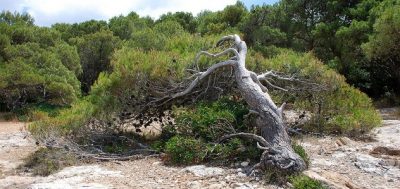Israel’s ORMAT Industries Ltd (NASDAQ:ORA) has joined with its subsidiary Opti Canada Inc (TSE:OPC) in a project in extract and produce a high grade of petroleum from oil sands located in northern Alberta Canada. ORMAT is a world leader in producing energy from unconventional sources, including geo-thermal energy from volcanoes and hot springs under the earth’s surface.
The company that likes to brand itself as a clean technology company the world over is not so quick to reveal that it is involved in what could be the dirtiest deal ever for the planet:
The northern-Alberta tar sands venture involves Ormat’s technology to use high pressure steam to extract the crude oil, presently trapped in the sands located deep below the earth’s surface. The process is known as steam assisted gravity drainage, or SAGD for short. It’s a dirty process, and some environmentalists say it will make current levels of greenhouse gases look meagre compared to what gets released during tar sands processing.
OPTI Canada Inc. is a subsidiary of the ORMAT Group of Companies. In business since 1965, Ormat has been a supplier of ultra reliable power units for the oil and gas industry, and has built renewable energy power plants producing 700 megawatts of electricity, in over 60 countries around the world.
The new venture in Canada hopes to produce a very high grade of premium “sweet crude oil” which has a low sulfur content and will be much easier for refineries to work with. But it is filthy in other ways. According to a 2008 Grist report from Environment Defense Canada:
The main reason is that extracting the oil from the sand is so energy intensive, from the large machines to the natural gas used to melt the bitumen out of the sand. It is estimated that by 2012 the Tar Sands will use as much gas as is needed to heat all the homes in Canada … Using huge amounts of relatively clean burning natural gas in order to produce dirty and carbon heavy oil is what commentators have dubbed “reverse alchemy” — the equivalent of turning gold into lead.
Ormat is known for its recovered energy processes, which creates energy by utilizing exhaust gas from compressor stations along interstate pipelines, midstream gas processing facilities and other energy-intensive processing industries such as cement production.
While the “sweet crude oil” venture seems like a good deal for those still interested in finding new sources of crude oil, including the Chinese, who are interested in investing in the tar sands project, at the end of the day, all that is really being done is merely extending the use of petroleum as a major energy fuel source with all its environmental implications.
The Ormat Group itself has already shown that it can produce viable energy output from a number of ecological friendly source, that also includes their ORMAT Energy Converter that uses an organic “motive fluid” that operates on a principle known as the Organic Rankine Cycle (ORC).
With all this in mind, innovative energy companies like Ormat might better devote their R&D efforts into more environmentally friendly energy projects, instead of ones which will merely extend the use of “Texas tea” as a world power supplier. Or come clean with their shareholders and advertise the fact that they are driving in part, what could be the most destructive project to date on our planet.
More on Ormat from our archives:
Ormat Taps Into Geo-Thermal Power In Indonesia
Ormat and Sunday To Build Largest Solar Roof In Middle East
(Photo via Opti Canada Inc.)
Karin Kloosterman contributed to this report.
UPDATE:
Reader Michael Wittig responds to this Green Prophet article in his own Green Prophet post: “Oil Sands Are Trying To Clean Up Dirty Business.”

![Long_Lake_Site__Oct_08_[1]](https://www.greenprophet.com/wp-content/uploads/2009/10/Long_Lake_Site__Oct_08_1-500x334.jpg)



I wonder why more people and companies aren't putting the pressure on Canada, and are blaming OPEC countries for interfering with climate change negotiations at Copenhagen. Canada has to pay the piper. I don't think it should be getting away with exploiting the Alberta tar sands.
I wonder why more people and companies aren't putting the pressure on Canada, and are blaming OPEC countries for interfering with climate change negotiations at Copenhagen. Canada has to pay the piper. I don't think it should be getting away with exploiting the Alberta tar sands.
I wonder why more people and companies aren't putting the pressure on Canada, and are blaming OPEC countries for interfering with climate change negotiations at Copenhagen. Canada has to pay the piper. I don't think it should be getting away with exploiting the Alberta tar sands.
China’s coal-fired stations least efficient in the world:
http://www.timesonline.co.uk/tol/news/environment/article6845107.ece
For every coal plant America shuts down, China opens 20.
I don’t think you will find a sane environmentalist anywhere that says the Canada tar sands are a good idea and that there is a clean way for extracting the oil.
Jason,
Says here Ormat is a major shareholder, unless something has changed:
Financial Post May 19:
When launched in 2001, the company introduced some of the biggest innovations in the business: It would be the largest oil sands project using steam-assisted gravity drainage technology, rather than strip mining, reducing its impact on the land; it would create synthetic gas by using bitumen waste, eliminating the need to burn natural gas; it would use brackish water that is 95% recycled rather than river water, addressing concerns about excessive water use in northern Alberta by the oil sands industry; it would upgrade its bitumen at a lower cost using a new process, funded by Israel-based Ormat Technologies Inc., still a major shareholder.
Read more: http://www.financialpost.com/story.html?id=1609891#ixzz0T9GkocPp
Recent spikes in Opti’s stock comes from rumors that a Chinese firm is looking to purchase Opti which had been causing cash hemorrhages in Ormat (http://uk.reuters.com/article/idUKLC17469820090112). This report cites $48 million. So if Ormat does not have a big stake in Opti who does?
China with its hand in the oil sands pot really scares the hell out of me. For them coal is the new oil.
http://www.google.com/hostednews/canadianpress/article/ALeqM5iWOom3gmGo6HpQgNox3cW3PCGdFA
Karin,
I reiterate that Opti Canada is a publicly traded company and has not been owned by ORMAT for quite some time. You may want to check the date of your source document. Ownership of a company is subject to change over time – a statement which is certaintly true with respect to Opti.
You will note that the corporate profile is currently as follows and contains no reference to ORMAT:
“OPTI Canada Inc. is a Calgary, Alberta-based company, established in 1999 to develop major integrated bitumen and heavy oil projects in Canada using its proprietary, next-generation OrCrude™ process. OPTI is focused on developing the fourth and next major integrated oil sands project in Canada, Phase 1 of the Long Lake Project (the Project), in a joint venture with Nexen Inc. in which OPTI has a 35 percent working interest.”
From the Opti website (company has same graphic logo as Ormat):
OPTI Canada was established in 1999 to focus on the recovery and upgrading of Canadian heavy oil using new eco-efficient technologies. OPTI has an office in Calgary, Alberta and is a member of the ORMAT Group of companies.
Opti Canada is not, as is stated in the article, a subsidiary of ORMAT. It is a publicly traded company on the Toronto stock exchange, and a review of public disclosure (SEDI) relating to its insiders does not reveal ORMAT as having a 10% or greater stake in Opti Canada.
Also, the article misleads by implying that OPTI Canada and ORMAT are actively involved with each other in this project. The only joint venture is between Nexen and Opti. Since losing 15% of the project to Nexen, Opti has been reduced to a non-operator in the project.
In my opinion we should leave the tar sands alone. I haven’t been there, but have travelled from one coast to the other in Canada – a country with so much large natural and pristine beauty, it makes your heart cry.
Canada is a rich country and obviously wants to exploit this potentially huge reserve. But it doesn’t need to if America gets itself off oil. Oil companies have already destroyed our earth’s lung in the Amazon:
http://edition.cnn.com/2009/WORLD/americas/10/02/ecuador.violence/
I don’t want to see this happening in Canada, or anywhere else for that matter. Oil sands are filthy according to any environment group’s assessment. If Ormat’s process is so great then why isn’t the company talking about it? I interviewed Dita Bronicki a few years ago and it felt as though she wanted to distance herself from this Canadian subsidiary. She wouldn’t talk about it at all.
Opti has been involved in processing the tar sands for years. If their process were so environmentally impact-less as David’s claim suggests, then why isn’t the company being given a green award?
Would either of you consider posting an article explaining Opti’s process better for our readers? We’d be happy to hear about it. I’ve read reports that the process does use natural gas (they were quite radical sites that I don’t want to link to here), but we’d be happy to have an “expert” give us the facts.
The information in this article is misleading. While existing tar sand extraction technologies use strip mines to recover the sands and use natural gas to drive the oil from them, the ORMAT technology does neither.
SAGD (Steam Assist, Gravity Drainage) is composed of a series of paired pipes inserted into tar sand deposits without the ecological disruption of strip mining. Steam is injected through the upper pipes, heating the underground deposit; heated oil is extracted as it drains into the lower set of pipes.
The ORMAT process, by which this crude is processed, splits off a fraction of the crude and – through hydrocracking – creates a synthetic gas that is used to generate steam. By this virtue, the ORMAT process does not use natural gas.
SO, this process has absolutely nothing to do with natural gas that would be used to heat homes or power other industries. Period.
NOW… this process does have a carbon footprint. Nobody at ORMAT, Opti, or Nexen (Opti’s majority partner in the Long Lake project) denies this. But please, don’t use hype and hysteria to bash an approach to oil sand development that is FAR AND AWAY a better process than the other tar sands developments out there.
Or should we go back to strip mining the stuff, and using up our very limited supplies of methane?
Good to see you have no idea what you are talking about.
“The company that likes to brand itself as a clean technology company the world over is not so quick to reveal that it is involved in what could be the dirtiest deal ever for the planet”
Seeing as the process is by far the cleanest that has been developed on the oil sands and is socially responsible as well as environmentally responsible you should do some more research before writing about what you do not know about.